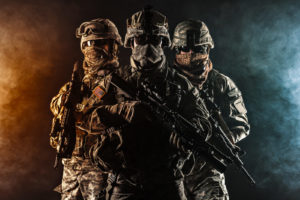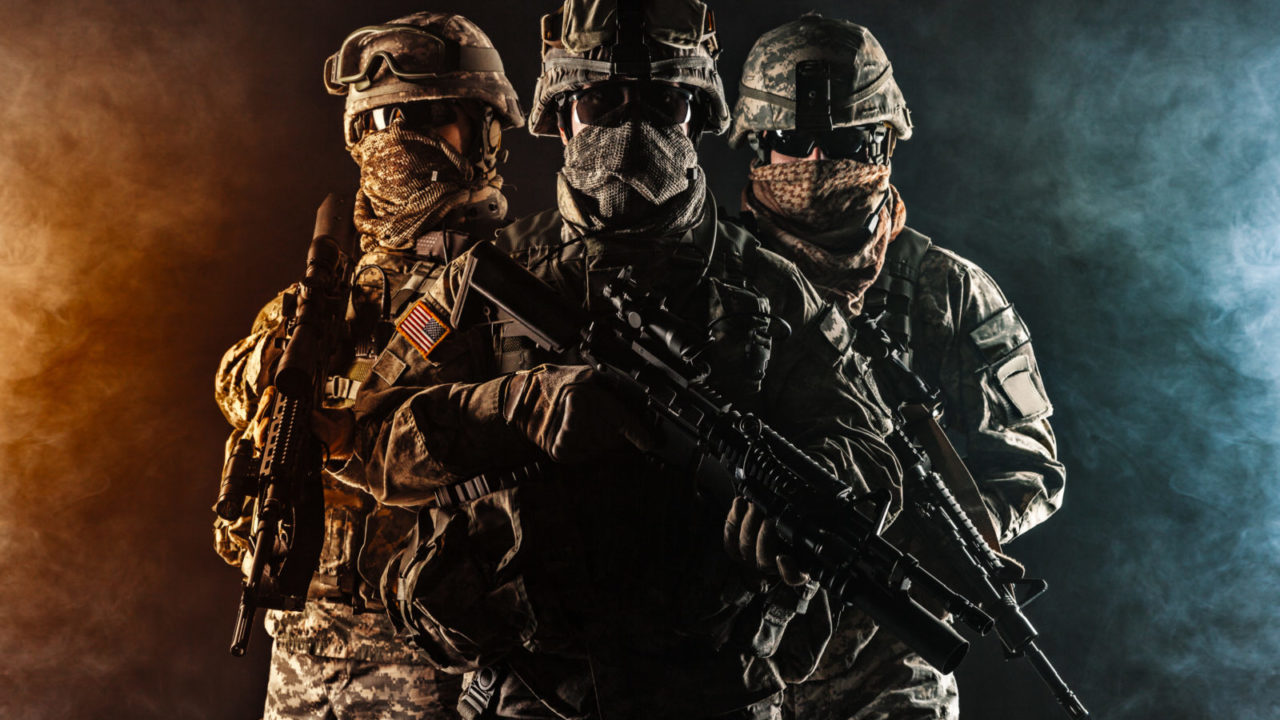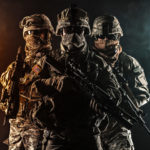This first appeared in The Havok Journal in January 2017.
_____________
Author’s Note: When it comes to terrorism, U.S. foreign policy and military operations, the true nature of Islam, and the extent of Islamic radicalization, there are no shortages of opinions. As a survivor of the 9/11 attacks and a former soldier, I certainly had my own. But when it came to discussing Islam intelligently, I had more questions than answers. Frustratingly, most interviews I’ve read or seen were apologias for Islam; of course, a few were reflexively anti-Islamic shoutfests.
So it was with an eye towards conducting a challenging, clarifying conversation that I asked Sayed and Deen, two Muslim-American veterans, to sit down and talk with me. We bonded quickly, the way soldiers do, over jokes, bullshit, and some shared bitching. I was impressed with their thoughtfulness and their passion. But our goal was understanding, not agreement. I found, in their answers, cause for both optimism and concern.
This interview is hardly the final answer on many of these subjects — we spoke for three hours and we could have spoken for twelve. But hopefully, over the course of this nine-part interview, we’ve managed to shed a little more light than heat on a range of subjects that sorely need it.
This is Part 5 of a nine-part series. You can start the series from the beginning here.
_______
CPM: I’m going to try out a parallel because I keep thinking about people who have never met a Muslim, will never meet a Muslim, and have no frame of reference for understanding Islam or its current struggles.
Based on what we’ve been talking about, is it fair to say that exponents of Islamic radicalization, like Abu Bakr Al-Baghdadi, are a little bit like John Brown prior to the American Civil War? I mean John Brown was a white abolitionist known for his fanaticism, who actually beheaded slave owners and terrorized them until he was finally captured at Harper’s Ferry. But his actions — his extremism — are considered the emotional catalyst that galvanized the nation into fighting a war to free the slaves.
Even though John Brown was a radical and arguably the first domestic terrorist, his actions were done in the name of freeing people from slavery.
Based on what you say are the dangers of monarchism and the perversions that it brings to Islam, is it fair to say that Daesh and similar radicals are in a sense, just the John Browns of Islam? That they commit a lot of violence and un-Islamic behavior but for an ostensibly decent purpose — eliminating the chief threat to Islam, eliminating the monarchy?
Sayed: That’s where it’s heading.

CPM: So, if that’s the case and in 10, 15, 20 or 50 years from now Islam will be in a good place because of this turbulence — what can we do today to make sure these radicals aren’t a threat to average rank-and-file people who could give a shit less about the state of Islam or its internal struggles? If you were the President of the US today, then how would you approach the problem of terrorism?
Deen: I’d start calling out some of our supporters — Arab allies — and bringing these questions up. Also, from my perspective in the Army and intelligence world, there are few to no Muslims involved. I know there are some qualified Muslims out there, Muslim Americans that can be policy guys, that can rely on their experience, both professional and personal, to help make policy, but you never really see any of these people out there.
The President says, “Hey Muslims, we want you to do more.” OK, well you have to give us a platform to do it.
CPM: Meaning what? What should that platform be?
Deen: I would start looking for the right candidates to fill some of these policy positions dealing with Counterterrorism. Who is our new ISIS czar? I mean, half of the people they find for these positions are just lawyers and non-Muslims.
Sayed: It’s not just at the highest levels, either. When I was in Iraq, they knew I was Muslim — I began to practice my faith more in the military. There were one or two guys in S2 [Note: the military intelligence section] who wanted to make a difference, but had no background in basic Muslim culture, so they would come to me on a daily basis to get guidance.
At first, I was all open to it, but when they started to get awards based upon the information and kind of work I did, I was like, “You’re on your own.” I wanted them to put me in those slots, because none of those guys knew anything and our cultural advisors, both who were contractors, were working banker hours.
In Iraq, Ramadan started the day before it does in the US — on the 20th in Iraq. We had an E7 who was not a Muslim, no foundation with Islam, but he was a cop in a very diversified city, which supposedly qualified him to be our training officer and authority on Islam. He was going around telling everybody that Ramadan started the 21st. We had a couple of other units under us in the compounds and they knew I was Muslim. One of them called me up and said, “Hey dude, I need a serious answer, when does Ramadan start?”
“Today. ”
“Are you fasting?”
“Yeah.”
I hear in the background, “Hey Sayed’s fasting, so we’re not doing anything. Thanks, man.”
I’m like, what was that about? Well, our policy was that if more than five detainees would refuse their meal, it’s considered a hunger strike and that opens up a whole can of worms — we have to wake up some very important people.
CPM: Does the United States need to be more culturally aware of the struggles going on inside Islam?
Sayed: Not culturally aware, but more religiously aware.
CPM: More religiously aware, OK.
If that’s the case, I think many Americans would say — and bear with me, I’m going to paint with a very broad brush — “Hey, we didn’t need to learn a lot about Germany to go beat the Nazis. We just decided that if they wanted to do us harm and if the Japanese are bombing us, then we’re just going to take them out. We’re not going to learn a lot about Shintoism, we’re not going to learn a lot about Nazism, we’re not going to learn a lot about Italian fascism, we’re just going in and doing what we need to do to defend the homeland.
I mean, isn’t it unrealistic, in this day and age, to ask Iowa farm boys to go learn all about Islam’s inner struggles just to take out bad guys?
Deen: If Nazism was a religion then…
CPM: But what about Shintoism, which fueled the Japanese state?
Deen: There wasn’t a billion of them. It wasn’t a religion that shares aspects with Christianity and Judaism.
CPM: What I’m getting at is, why do we have to talk to Saudi Arabia about how to fix their house? Why can’t we simply lay down the law to terrorists? If Daesh wants to be killing innocent people, beheading reporters, raping women, hey, they need to prepare to be smacked.
Deen: What’s going to happen, just like with al-Qaeda, we’ll kill all the top guys, but the ideology will still continue.
We just killed the finance minster of ISIS. You go ahead and kill that guy — it doesn’t matter, another person will come.
CPM: Because the monarchy is still there in Saudi Arabia.
Deen: Right — the motivator of their ideology. Basically Islam is broken.
CPM: So, if the monarchy in Saudi Arabia disappeared tomorrow, would ISIS disappear?
Sayed: It would be a bloody transition.
Deen: I’m not saying this is going to happen overnight.
CPM: But hypothetically, if the pretense in Saudi Arabia was over — if the monarchy was eliminated — would ISIS still have a popular recruiting platform or would it disappear?
Deen: I think it would disappear. It should, because some of ISIS’ stuff is such a perversion of Islam. You can’t just make someone convert, “Hey man, I’m not going to give you an option, either you convert or you die.” If you converted on someone else’s terms to live, to survive, why would I even want you in my religion? You’re just converting to save yourself.
That’s what I’m saying to you, the ideology is not in line with what it should be. Now that will evolve, that will probably evolve in the next couple of other groups…
CPM: Kind of like the Corleone family? Essentially, “We’re mobsters now, but in a few years, it’s going to be a legit business.” Is that fair to say?
Sayed: I think what people don’t understand is that, for Muslims, whether you’re a MINO — a “Muslim-in-name-only” — or a radical, we all believe we are slaves or servants of God. We’re created to worship God, that’s one of our tenets. “This life is a journey,” “The afterlife is more important than this one” and “Jihad” — that’s the core faith. It all comes down to how you interpret it.
Let’s say we’re both Mets fans. You’re a normal Mets fan, supporting the team, keeping up on it. But I’m a radical Mets fan — I believe in the same tenets, but I say we have to start killing Yankees fans. I’ve got to blow up Yankee stadium, because that’s the only way to bring more people to our cause of being Mets fans. Either I need some help or I’m just completely misguided, but the core tenets that we believe are the same, we both see being Mets fans is a way to support our community and as a way to the path to God, in a sense.
So, if you ask a Muslim, whether it’s someone from the United States or someone from the backwoods of Afghanistan, they’ll have the same notions to some extent. The person in the US will probably have a deeper understanding and realize that their place is to be a good citizen, but the person in Afghanistan, because of ignorance, won’t.
We need to get more Muslims involved in resolving terrorism, because part of the recruiting push is that the West doesn’t trust Muslims. Daesh and al-Qaeda say the West doesn’t trust us and that the West won’t put us in critical positions.
We also have scholars in this country, in the UK and the West — I’m thinking of guys like Suhaib Webb, Nouman Ali Khan. We could basically broadcast their sermons, their podcasts, their videos across the spectrum, almost like a information operations campaign in the Middle East …
CPM: Kind of like Voice of America.
Sayed: It’s important because, in the Koran, a line may mean one thing to readers in New Jersey, but another to readers in California, and something totally different in Beijing. You, as an American, in the year 2015, could interpret a line of the Koran completely differently than I would as a Canadian in the 1960s.
Now, you don’t need an imam to practice Islam, but the way that Islam is set up, you are required to seek knowledge and get a better understanding, because, with it being a different type of Arabic, you have to take a look at what you’re reading and how it applies it you.
It’s a simple faith, but it can also become complex. The core thing that people need to realize is that we are servants of God — our entire life is to serve God. You’re striving for the afterlife, you’re striving to make the world a better place in a sense, but that can be perverted, as Deen said, to the point I have to put a suicide vest on and blow up somebody who doesn’t agree with me because they’re a threat.
_______
Chris writes regularly at The Havok Journal in addition to hosting The Weekly Havok podcast. He is a former nightclub bouncer, firefighter, corporate security trainer, and prison chaplain. He has done stand-up, been homeless for extended periods of time, had screenplays optioned, and gotten married. He was also in the military and spent 33 months in foreign combat zones, earning a Bronze Star in Afghanistan. He has written one book, edited another, and is working on a third. He can be reached at Savage Wonder.
Buy Me A Coffee
The Havok Journal seeks to serve as a voice of the Veteran and First Responder communities through a focus on current affairs and articles of interest to the public in general, and the veteran community in particular. We strive to offer timely, current, and informative content, with the occasional piece focused on entertainment. We are continually expanding and striving to improve the readers’ experience.
© 2024 The Havok Journal
The Havok Journal welcomes re-posting of our original content as long as it is done in compliance with our Terms of Use.

